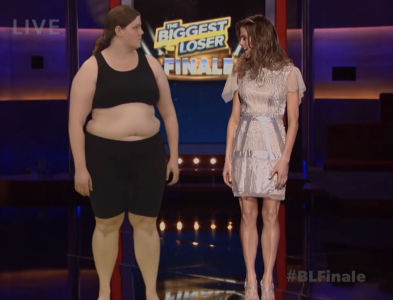Why The Biggest Loser really disappeared—and what it revealed about weight loss on TV
By
Veronica E.
- Replies 0
For more than a decade, The Biggest Loser was one of the most talked-about reality shows on television.
It promised life-changing transformations, large cash prizes, and the emotional highs of personal redemption—all played out in front of millions.
But over time, concerns began to mount about the show’s behind-the-scenes methods and the long-term well-being of its contestants.
What started as a motivational journey toward health gradually turned into a national debate about safety, ethics, and the cost of quick fixes.
So what really happened to The Biggest Loser, and what does its legacy say about how we view health and weight in America today?

A blockbuster hit with growing concerns
When The Biggest Loser debuted in 2004, it became an instant hit.
Viewers were drawn to the intense workouts, emotional weigh-ins, and dramatic before-and-after reveals.
Each season, contestants competed for a $250,000 prize by losing the most weight under the guidance of celebrity trainers.
But as the years went on, criticism began to grow.
Health experts questioned whether the show’s methods were sustainable—or even safe—for those involved.
Also read: 21 hilarious game show answers that left everyone laughing
Controversy takes center stage
The turning point came in 2014, when Season 15 winner Rachel Frederickson appeared at the finale with a dramatic 155-pound weight loss, prompting visible concern from trainers and viewers alike.
The backlash was swift, with many accusing the show of encouraging unhealthy standards.
In 2016, a study published in The New York Times followed Season 8 contestants and found that most had regained the weight—and in some cases, even more.
Researchers also discovered that participants’ metabolisms had slowed drastically, making it harder to maintain weight loss.
Former contestants began speaking out, calling their experiences traumatic and urging for the show’s cancellation.
Also read: Don't cancel your YouTube TV subscription just yet—here's how you can claim a $10 credit!
Allegations and ethical questions
The controversy didn’t stop with weight regain.
Former contestant Joelle Gwynn accused the show of distributing unapproved weight loss drugs—an allegation denied by producers, though it led to an internal investigation.
Meanwhile, trainer Jillian Michaels admitted to giving her team caffeine pills during one season, a decision that resulted in penalties.
Disagreements between Michaels and the show’s medical advisor spilled into the press, raising further concerns about transparency and medical oversight behind the scenes.
Also read: Could you have guessed this puzzling answer on live TV?
The show fades out quietly
In 2016, NBC stopped producing new episodes of The Biggest Loser without a formal cancellation announcement.
After a four-year break, the show returned for a single season on USA Network in 2020, promising a gentler approach focused on overall health and long-term wellness.
The reboot included gym memberships, nutritionist support, and group counseling for contestants.
But ratings remained low, and after crowning one final winner, the show quietly disappeared once again.
Also read: This WWE legend's popular TV show cancelled shockingly soon—find out why!
What we learned from the show’s rise and fall
The story of The Biggest Loser sparked broader discussions about how weight, health, and body image are portrayed on television.
Many now view the show as a cautionary tale about the dangers of rapid weight loss and public accountability.
Medical professionals stress the importance of sustainable lifestyle changes rather than extreme methods.
As a result, conversations about weight have become more focused on mental health, body positivity, and long-term well-being.

Also read: You won’t believe which classic game show topped the charts—and what’s not working with Ryan Seacrest’s show!
Where are they now?
Some of the show’s biggest names have moved on to new ventures.
Trainer Bob Harper remains active in the fitness world and has authored several books.
Jillian Michaels has built a fitness and wellness brand of her own.
Several former contestants have become vocal advocates for body positivity, sharing both the highs and challenges of their time on the show and the lessons they’ve carried forward.
Also read: Remembering Wink Martindale: The beloved game show host who brought joy into American homes
A shift toward healthier values
If there’s a bright side to the controversy, it’s that the wellness industry has started to move away from crash diets and toward a more balanced view of health.
People are increasingly aware that lasting change takes time, and that emotional well-being is just as important as physical progress.
The Biggest Loser may be off the air, but the conversations it started are helping reshape how we talk about weight and self-care.
Read next: Proposed TV show would feature immigrants competing for citizenship—here’s what’s behind “The American”

Did The Biggest Loser ever inspire you to make a lifestyle change—or did it leave you with more questions than motivation? Have you ever tried a weight loss program that promised fast results?
We’d love to hear how your views on weight, health, and wellness have evolved. Share your story in the comments—your experience could help others navigate their own journey toward better health.
It promised life-changing transformations, large cash prizes, and the emotional highs of personal redemption—all played out in front of millions.
But over time, concerns began to mount about the show’s behind-the-scenes methods and the long-term well-being of its contestants.
What started as a motivational journey toward health gradually turned into a national debate about safety, ethics, and the cost of quick fixes.
So what really happened to The Biggest Loser, and what does its legacy say about how we view health and weight in America today?

Once a ratings powerhouse, The Biggest Loser became one of TV’s most debated reality shows due to its extreme weight loss methods and behind-the-scenes controversy. Image Source: YouTube / Coffee and Cults.
A blockbuster hit with growing concerns
When The Biggest Loser debuted in 2004, it became an instant hit.
Viewers were drawn to the intense workouts, emotional weigh-ins, and dramatic before-and-after reveals.
Each season, contestants competed for a $250,000 prize by losing the most weight under the guidance of celebrity trainers.
But as the years went on, criticism began to grow.
Health experts questioned whether the show’s methods were sustainable—or even safe—for those involved.
Also read: 21 hilarious game show answers that left everyone laughing
Controversy takes center stage
The turning point came in 2014, when Season 15 winner Rachel Frederickson appeared at the finale with a dramatic 155-pound weight loss, prompting visible concern from trainers and viewers alike.
The backlash was swift, with many accusing the show of encouraging unhealthy standards.
In 2016, a study published in The New York Times followed Season 8 contestants and found that most had regained the weight—and in some cases, even more.
Researchers also discovered that participants’ metabolisms had slowed drastically, making it harder to maintain weight loss.
Former contestants began speaking out, calling their experiences traumatic and urging for the show’s cancellation.
Also read: Don't cancel your YouTube TV subscription just yet—here's how you can claim a $10 credit!
Allegations and ethical questions
The controversy didn’t stop with weight regain.
Former contestant Joelle Gwynn accused the show of distributing unapproved weight loss drugs—an allegation denied by producers, though it led to an internal investigation.
Meanwhile, trainer Jillian Michaels admitted to giving her team caffeine pills during one season, a decision that resulted in penalties.
Disagreements between Michaels and the show’s medical advisor spilled into the press, raising further concerns about transparency and medical oversight behind the scenes.
Also read: Could you have guessed this puzzling answer on live TV?
The show fades out quietly
In 2016, NBC stopped producing new episodes of The Biggest Loser without a formal cancellation announcement.
After a four-year break, the show returned for a single season on USA Network in 2020, promising a gentler approach focused on overall health and long-term wellness.
The reboot included gym memberships, nutritionist support, and group counseling for contestants.
But ratings remained low, and after crowning one final winner, the show quietly disappeared once again.
Also read: This WWE legend's popular TV show cancelled shockingly soon—find out why!
What we learned from the show’s rise and fall
The story of The Biggest Loser sparked broader discussions about how weight, health, and body image are portrayed on television.
Many now view the show as a cautionary tale about the dangers of rapid weight loss and public accountability.
Medical professionals stress the importance of sustainable lifestyle changes rather than extreme methods.
As a result, conversations about weight have become more focused on mental health, body positivity, and long-term well-being.

Rachel Frederickson’s dramatic weight loss at the Season 15 finale sparked public concern and renewed debate about the show’s approach to health. Image Source: Facebook / Entertainment Tonight.
Also read: You won’t believe which classic game show topped the charts—and what’s not working with Ryan Seacrest’s show!
Where are they now?
Some of the show’s biggest names have moved on to new ventures.
Trainer Bob Harper remains active in the fitness world and has authored several books.
Jillian Michaels has built a fitness and wellness brand of her own.
Several former contestants have become vocal advocates for body positivity, sharing both the highs and challenges of their time on the show and the lessons they’ve carried forward.
Also read: Remembering Wink Martindale: The beloved game show host who brought joy into American homes
A shift toward healthier values
If there’s a bright side to the controversy, it’s that the wellness industry has started to move away from crash diets and toward a more balanced view of health.
People are increasingly aware that lasting change takes time, and that emotional well-being is just as important as physical progress.
The Biggest Loser may be off the air, but the conversations it started are helping reshape how we talk about weight and self-care.
Read next: Proposed TV show would feature immigrants competing for citizenship—here’s what’s behind “The American”
Key Takeaways
- The Biggest Loser ended after widespread backlash over unsafe weight loss methods and long-term health consequences for contestants.
- A 2016 study revealed slowed metabolisms and significant weight regain in former participants, challenging the show’s claims of lasting transformation.
- Allegations of drug use and the use of caffeine pills during filming added to concerns, leading to investigations and public criticism.
- A 2020 reboot aimed to promote healthier values but failed to regain popularity, and the show has not aired since.
Did The Biggest Loser ever inspire you to make a lifestyle change—or did it leave you with more questions than motivation? Have you ever tried a weight loss program that promised fast results?
We’d love to hear how your views on weight, health, and wellness have evolved. Share your story in the comments—your experience could help others navigate their own journey toward better health.






